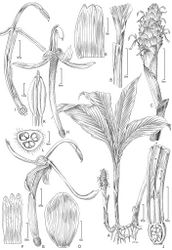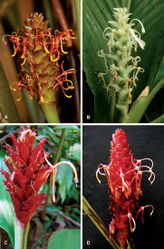Larsenianthus wardianus
| Notice: | This page is derived from the original publication listed below, whose author(s) should always be credited. Further contributors may edit and improve the content of this page and, consequently, need to be credited as well (see page history). Any assessment of factual correctness requires a careful review of the original article as well as of subsequent contributions.
If you are uncertain whether your planned contribution is correct or not, we suggest that you use the associated discussion page instead of editing the page directly. This page should be cited as follows (rationale):
Citation formats to copy and paste
BibTeX: @article{Kress2010PhytoKeys1, RIS/ Endnote: TY - JOUR Wikipedia/ Citizendium: <ref name="Kress2010PhytoKeys1">{{Citation See also the citation download page at the journal. |
Familia: Zingiberaceae
Genus: Larsenianthus
Name
Larsenianthus wardianus W. J. Kress, Thet Htun & Bordelon sp. nov. – Wikispecies link – IPNI link – Pensoft Profile
Latin
Nova species L. careyano affinis, a quo minore statura, congestis foliis, inflorescentia radicali in bractea sine foliis, cum paucis floribus in unaquisque bractea differt.
Type
Myanmar: Kachin State: Myitkyina Township, NW section of Pidaung Wildlife Sanctuary, approx. 15 km. from Myitkyina, 25°34'52" N, 97°14'56" E, understory of evergreen forest. 22 February 2002. W. J. Kress, Thet Htun, M. Bordelon, and Khin Maung Ha 02-7054 (living plant only for cultivation). Plants of #02-7054 cultivated at the Smithsonian Botany Research Greenhouses. 14 April 2010. W. J. Kress 10-8750 (holotype: US!; isotypes RAF!, E!).
Description
Evergreen herb, medium-size to 125 cm tall; rhizome to 2.0 cm in diameter, fibrous, aromatic, inner color white; tubers present. Leafy shoots 10–20 per plant, erect, densely clumped. Leaves 4–5 per shoot, to 118 cm in total length; basal leaf sheaths reddish and glabrous, ca. 30 cm in length × 5 cm in width; sheathing petioles to 52 cm in length × 1.5 cm in diameter, glabrous, green and clasping stem, margin slightly revolute; ligule small, 10 mm in length × 1 mm in width, not lobed, truncate on petiole, papery and ephemeral disappearing in mature leaves; lamina 67 cm in length × 14 cm in width, ovate, green and glabrous above, lower midrib green and glabrous, base long attenuate onto petiole, slightly subequal, apex acuminate, adaxial surface dark green. Inflorescence basal on leafless shoot, erect to 33 cm in height; peduncle 20 cm in length × 1.0–1.5 cm in diameter, glabrous, lower sheaths red, upper sheaths green; spike ovoid, 6–10 cm in length × 4–5 cm in diameter; rachis straight; inflorescence bracts about 40 per inflorescence, 1–2 lower bracts sterile, bracts 3.7 cm in length × 2.4 cm in width at base of inflorescence, 2.0 cm in length × 1.8 cm in width distally, spirally arranged and imbricate, not pouched, held at 40° from vertical axis, glabrous, bright green with reddish apex, margins smooth; bracteoles not tubular, 2.1 cm in length × 1.6 cm in width, glabrous, pale white with reddish apex. Flowers conspicuous, 3–4 per bract; calyx tubular, 1.5 cm long, tri-lobed with central lobe shortest, pale yellow to pink; floral tube 3.2 cm in length × 2.0 mm in diameter, reddish pink, externally glabrous with scattered unicellular papillate hairs inside, lobed with each lobe 1.4 cm in length, reflexed; lateral staminodes 3.0 mm in length × 2.0 mm in width, cup-shaped, glabrous, red; labellum 2.2 cm in length × 3.0 mm in width at apex, linear to spatulate, not lobed, red basally with yellow apex, glabrous; fertile stamen with filament 2.1 cm long, red at throat of corolla becoming yellow distally, glabrous; anther 3.0 mm in length × 2.0 mm in width, without a crest; pollen pale yellow; epigynous glands two, linear; stigma minute, <1 mm across, white, extending slightly beyond anther; ovary trilocular, 2.0 mm in length × 2.0 mm in width, pubescent, white to cream colored. Fruits and seeds unknown.
Distribution
Known only from the type locality in Kachin State, upper Myanmar.
Ecology
This species is found in the understory of evergreen forests dominated by members of the family Dipterocarpaceae in the foothills of the Himalayas.
Etymology
Named for Francis Kingdon-Ward, the British plant collector who extensively explored Upper Burma in the first half of the twentieth century and who inspired the authors of this species in their work in Myanmar (Kress et al. 2003[1], Kress 2009[2]).
Other specimens examined
Known from the type collection in Padaung National Park west of Myitkyina, Kachin State, Myanmar, as well as cultivated material (Smithsonian Botany Research Greenhouse GH-2002-050) collected at the type locality.
Original Description
- Kress, W; D. Mood, J; Sabu, M; Prince, L; Dey, S; Sanoj, E; 2010: Larsenianthus, a new Asian genus of Gingers (Zingiberaceae) with four species PhytoKeys, 1: 15-32. doi
Other References
- ↑ Kress W, DeFilipps R, Farr E, Daw Yin Yin K (2003) A Checklist of the trees, shrubs, herbs and climbers of Myanmar (Revised from the original works by J. H. Lace and H. G. Hundley). Contributions from the United States National Herbarium 45:1-590.
- ↑ Kress W (2009) The Weeping Goldsmith – Discoveries in the Secret Land of Myanmar. Abbeville Press Inc., New York, 1–272.
Images
|

